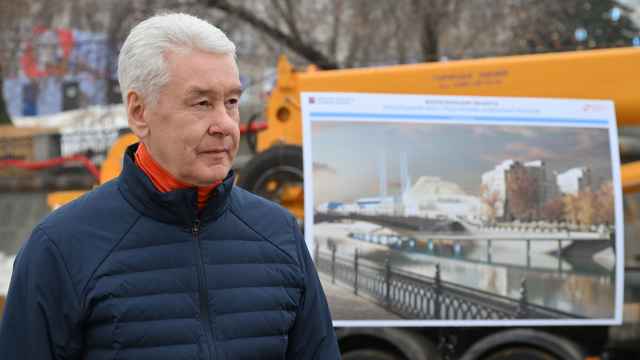GENEVA — A conference on ending the fighting in Syria may be held in July, international envoy for Syria Lakhdar Brahimi said after preparatory talks with U.S. and Russian officials on Wednesday.
He said the sole sticking point was that the two Syrian sides themselves were not yet ready to commit to the conference. He will chair a second round of preparatory talks on June 25.
Russian Deputy Foreign Minister Gennady Gatilov said Wednesday's meeting failed to resolve various questions about the proposed conference, including who would take part, according to Interfax.
"The most difficult question is the circle of participants in the conference. The whole issue is that the Syrian opposition, unlike the government, has not made a fundamental decision about its participation in this conference," Interfax quoted Gatilov as saying.
U.S. Secretary of State John Kerry and Russian Foreign Minister Sergei Lavrov have been engaged in an intensive effort to get Syria's government and opposition into peace talks. Deputies for the two top diplomats attended Wednesday's meeting with Brahimi.
In recent days, Russia and the U.S. have continued to spar on issues related to Syria, underlining the distance between their positions.
U.S. officials said Tuesday that the Obama administration came back empty-handed after a diplomatic delegation to Moscow last month presented intelligence suggesting that Syrian President Bashar Assad's government used chemical weapons on its own people.
The U.S. officials said that while some of the information presented wasn't new, it reflected the ongoing effort by the United States to persuade Russia to drop its support for the Assad regime two years into a conflict that has claimed more than 70,000 lives. One official described it as the U.S. government's "best evidence" of chemical weapons use by regime forces, even if President Barack Obama and others in the administration say they still lack incontrovertible proof of chemical weapons attacks, which would represent a crossing of Obama's "red line" for potential military action.
French Foreign Minister Laurent Fabius said Tuesday that tests carried out by a French laboratory confirmed that sarin gas has been used multiple times and at least once by Syrian government forces and their accomplices. Earlier Tuesday, a UN panel said there were "reasonable grounds" to believe that limited quantities of toxic chemicals were used as weapons in at least four attacks in Syria's civil war, but that more evidence was needed to determine the precise chemical agents involved and who used them.
The U.S. officials, who weren't authorized to speak publicly on the matter and demanded anonymity, said the intelligence failed to convince Russian officials and prompted no change in the Kremlin's support for Assad — a disappointment for the U.S., considering the promises of closer cooperation after several recent meetings and conversations between Kerry and Lavrov.
Also on Tuesday, the United States said it will deploy Patriot missiles and F-16 fighter jets to Jordan for military exercises this month and may consider keeping them there longer, an announcement that drew swift condemnation from Moscow, which accused the West of sending weapons to fuel Syria's civil war.
The Eager Lion exercises — held annually with a theme of irregular warfare — will include more than 8,000 service members from about 19 countries, one U.S. official said, adding the drills would run from June 9 to 20.
If left in Jordan, Patriot missiles could be used to protect the country — a Sunni Muslim U.S. ally — against any possible missile attack as the Syrian war threatens to widen into a more regional, sectarian conflict.
The decision to send Patriot missiles to Jordan is particularly controversial for Russia, which believes the missiles could be used by the United States and its allies to impose a no-fly zone over Syria, heralding the first direct Western military intervention in the conflict.
"We have more than once stated our opinion on this — foreign weapons are being pumped into an explosive region," Russian Foreign Ministry spokesman Alexander Lukashevich said in a statement.
Moscow complained vociferously last year when the United States, Germany and the Netherlands deployed Patriots on Syria's northern border in Turkey, a NATO ally. NATO said the Patriots were sent there as a precaution in case missiles were fired over the border from Syria.
Moscow said that decision was a factor in its decision to go ahead with plans to send its own anti-aircraft system, the S-300, to Assad's government.
The Russian system has not yet been deployed but Moscow has said it would fulfill the delivery contract.
Material from The Associated Press is included in this report.
A Message from The Moscow Times:
Dear readers,
We are facing unprecedented challenges. Russia's Prosecutor General's Office has designated The Moscow Times as an "undesirable" organization, criminalizing our work and putting our staff at risk of prosecution. This follows our earlier unjust labeling as a "foreign agent."
These actions are direct attempts to silence independent journalism in Russia. The authorities claim our work "discredits the decisions of the Russian leadership." We see things differently: we strive to provide accurate, unbiased reporting on Russia.
We, the journalists of The Moscow Times, refuse to be silenced. But to continue our work, we need your help.
Your support, no matter how small, makes a world of difference. If you can, please support us monthly starting from just $2. It's quick to set up, and every contribution makes a significant impact.
By supporting The Moscow Times, you're defending open, independent journalism in the face of repression. Thank you for standing with us.
Remind me later.





